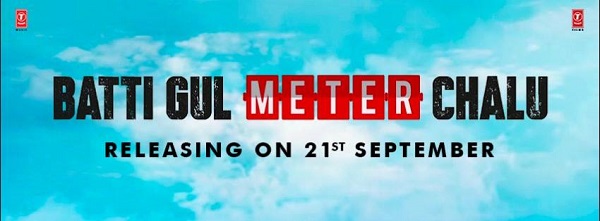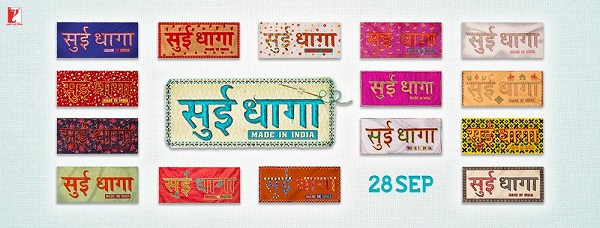![]()
Songs and musician credits at the end.
That the music of Manmarziyaan would be a throwback to that of Udta Punjab on some level, looked a strong possibility from the movie’s trailer and the crew members involved. And the soundtrack does indeed have multiple moments when you are likely to think of some UP track, or even some other Amit Trivedi composition from the past – thankfully hardly any of it comes across in an ennui-inducing fashion like quite a few of Amit Trivedi’s songs have been sounding in recent times. A lot of it is also owing to the individual brilliance of the artists the composer picks to work with him here. Take Daryaa for instance – flautist Paras Nath bolstering the song over the familiar AT rock base to glorious effect, and is fittingly assigned the duty of closing the song with a heart-warming 30-second solo, even as Shahid Mallya and Ammy Virk’s (both in fine form) voices fade away. An unplugged version of the song (the only song with two versions in the 14-song album) accentuates the longing in the tune and Shellee’s (another of the soundtrack’s stars) lines – in fact in this form it almost feels like a throwback to the impromptu acoustic sessions during college days (am I the only one who got specifically reminded of Zeest’s legendary Sutta Na Mila?). Of course those college sessions did not feature the brilliant guitar improvisations of the kind Sanjoy Das produces in the interlude here. Deveshi Sahgal’s singing isn’t a match for what Mallya and Virk accomplish, but she manages to convey that emotion well. Reuniting with Trivedi after Udta Punjab, Mallya gets one more song in the album, a piece for the lovelorn titled Sacchi Mohabbat that he delivers with an equally competent Jonita Gandhi. Two more exceptional musicians steal the show in the backdrop, Arshad Khan on the esraj and Omkar Dhumal on shehnai, both of whom Amit employs in the album on multiple occasions. Another of the album’s lightest compositions is Chonch Ladiyaan, where the composer is in top form with his arrangement. Arshad Khan’s esraj once again finds spectaular usage (in a way occasionally evocative of Manjha from Kai Po Che), but equally winning is Satyajit Jamsandekar’s percussion (love that there is a subtle inclusion of the ghunghroo sound every time the naache phrase appears). And giving life to Shellee’s words loaded with incredibly imaginative analogies, are Jazim Sharma and Harshdeep Kaur (who is having a great year so far).
The movie’s title song, titled Jaisi Teri Marzi, sees Kaur share vocal duties with Bhanu Pratap Singh. The song is quite commonplace in its feel-good-ness, but passes muster for the singing quality and interesting treatment, especially with the percussion; riding on finger snaps until Kaur utters Manmarziyaan, over a minute and a half into the song wherein Sanket Naik’s dhols kick in. Shellee invents the word fyaar (supposedly implying lust) for Manmarziyaan, and it appears in two of the songs. F for Fyaar (that title in a movie produced by Fuh Se Phantom – surely more than just a coincidence?) carries an indisputable similarity to the dark, pulsating folktronica that dominated Udta Punjab’s soundscape. The sound works quite effectively here too, that said – Mast Ali’s earnest voice sort of keeps the song grounded, and Sikander Kahlon’s rap entry, though not great writing, is a nice touch too. Props also to Tapas Roy for his work on the tumbi. In Fyaar Pe Duniya the composer goes for a 90s flavour. Not a big fan of this song, but it is nice to hear Alamgir Khan after a gap. The mercurial Rumi (played by Taapsee Pannu) gets two searing tributes in the soundtrack. Devenderpal Singh and Babu Haabi deliver Bijlee Giregi which is again built on a standard folksy tune, but works for the thrumming electronic backdrop and Shellee’s words – sample cutie pie ni kutti pie hai! It is Prabh Deep’s Sherni (which he writes himself) which is a much more engaging affair musically. The dubstep-ish arrangement is absolutely heady, and I loved the way Prabh Deep raps – it’s a pity the song lasts just 1.5 minutes.
Amit Trivedi channels his oft (and successfully) employed sprightly dance track format to create Dhayanchand, and here too it is highly likely you will end up humming Dhyaan Kithe Dhyanchand for a long time after the song is done. Once again, the folk instruments featured – and there is quite an assortment, played by Vijay Yamla (who is also credited as a singer) and Kuku Duggi – contribute big time to the song’s allure. Similar story with the wedding themed song, Kundali – trademark Amit Trivedi arrangements, but man what an addictive groove that Laao ji laao refrain has! The ladies singing the song (all singers whom Amit has featured in his songs in the past) are in their elements, as is Omkar Dhumal with his shehnai (also watch out for that cameo from harmonium master Akhlak Hussain Varsi towards the very end). Shellee’s snappy lines are a riot, even incorporating a DDLJ reference at one point. The most heartening aspect of the song Jala Di is to hear Romy singing for Amit; I have been lamenting the fact that only Shashwat Sachdev seems inclined to use the very talented singer – and it is indeed his singing along with Jatinder Singh that is the highlight of the fairly regular Punjabi track peppered with occasional electronic segues. Romy is also heard in Hallaa, one of my two top favourites from the album. It is Jyoti Nooran who shines in the vocal department here though with a supreme effort, even as Amit builds a hypnotic electronic piece around the simple yet highly addictive melody. Finally, my other favourite, Grey Walaa Shade, where Shellee continues in the fyaar vein, talking of mutual favour and the like. The song however starts off on a more sedate note, with Jazim Sharma’s soulful rendition of the opening lines, before Harshdeep Kaur makes her entry with the flirtatious tone in Ishq Nazariya – love the way Amit has structured the melody here. Sharma sounds almost like Rahat Fateh Ali Khan used to sound in his Bol Na Halke Halke times (I know this sounds mean, but when Jazim Sharma sings ghise pitey version-nu maaro update, it takes on an additional implication to me, in this context!) – I hope we get to hear more of him.
Manmarziyaan. Director Anurag Kashyap’s reunion with Amit Trivedi brings back his love for mammoth soundtracks. While the repetitiveness gets in the way on more than one occasion this time, the composer still manages to deliver a supremely engaging soundtrack, with ample help from Shellee and a bunch of incredible musicians. Also doffing my hat to Anurag Kashyap for the way he has used the songs in the movie.
Music Aloud Rating: 4/5
Top Recos: Hallaa, Grey Walaa Shade, Kundali, Chonch Ladiyaan, Dhayaanchand, Daryaa
This review first appeared in the Mumbai edition of The Hindu.
Musician Credits
1) F For Fyaar
Singers: Vicky Kaushal & Mast Ali
Rap By: Sikander Kahlon
Music: Amit Trivedi
Lyrics: Shellee
Rap Lyrics: Sikander Kahlon
Programmed & Arranged By: Amit Trivedi
Recording Engineers A T Studios Mumbai – Abhishek Sortey & Urmila Sutar
Assisted By: Firoz Shaikh
Mixed & Mastered By: Shadab Rayeen, A T Studios & New Edge – Mumbai.
Assisted By: Abhishek Sortey & Dhananjay Khapekar
Executive Producer: A T Studios – Krutee Trivedi
Head Of Production: A T Studios – Aashish Narula
Programmed By: Amit Trivedi & Vineeth Jayan
Tumbi : Tapas Roy
2) Daryaa
Singers: Ammy Virk & Shahid Mallya
Music: Amit Trivedi
Lyrics: Shellee
Produced & Arranged By: Amit Trivedi
Recording Engineers A T Studios Mumbai – Abhishek Sortey & Urmila Sutar
Assisted By: Firoz Shaikh
Mixed & Mastered By: Shadab Rayeen, A T Studios & New Edge – Mumbai
Assisted By: Abhishek Sortey & Dhananjay Khapekar
Executive Producer: A T Studios – Krutee Trivedi
Head Of Production: A T Studios – Aashish Narula
Programmed By: Amit Trivedi, Gourab Dutta & Vineeth Jayan
Flute By: Paras Nath
Guitar By: Sanjoy Das
3) Grey Walaa Shade
Singers: Harshdeep Kaur & Jazim Sharma
Music: Amit Trivedi
Lyrics: Shellee
Produced & Arranged By: Amit Trivedi
Recording Engineers A T Studios Mumbai: Abhishek Sortey & Urmila Sutar
Assisted By: Firoz Shaikh
Mixed & Mastered By: Shadab Rayeen, A T Studios & New Edge – Mumbai
Assisted By: Abhishek Sortey & Dhananjay Khapekar
Executive Producer: A T Studios – Krutee Trivedi
Head Of Production: A T Studios – Aashish Narula
Programmed By: Amit Trivedi, Gourab Dutta & Raja Rasaily
Guitar By: Ridu Shaw
4) DhayaanChand
Singers: Vijay Yamla, Nikhita Gandhi, Amit Trivedi & Suhas Sawant
Music: Amit Trivedi
Lyrics: Shellee
Programmed & Arranged By: Amit Trivedi
Recording Engineers A T Studios Mumbai – Abhishek Sortey & Urmila Sutar
Assisted By: Firoz Shaikh
Folk Instruments Recording Studio Inderlok Studio (Ludhiana) Recording Engineer – Dinesh Sharma
Mixed & Mastered By: Shadab Rayeen, A T Studios & New Edge – Mumbai
Assisted By: Abhishek Sortey & Dhananjay Khapekar
Executive Producer: A T Studios – Krutee Trivedi
Head Of Production: A T Studios – Aashish Narula
Programmed By: Amit Trivedi & Vineeth Jayan
Tumbi, Tumba, Been, Dhadd & Bugdu By: Vijay Yamla
Dhol By: Kukki Jogi
5) Chonch Ladhiyaan
Singers: Harshdeep Kaur & Jazim Sharma
Music: Amit Trivedi
Lyrics: Shellee
Produced & Arranged By: Amit Trivedi
Recording Engineers A T Studios Mumbai – Abhishek Sortey & Urmila Sutar
Assisted By: Firoz Shaikh
Mixed & Mastered By: Shadab Rayeen, A T Studios & New Edge – Mumbai
Assisted By: Abhishek Sortey & Dhananjay Khapekar
Executive Producer: A T Studios – Krutee Trivedi
Head Of Production: A T Studios – Aashish Narula
Programmed By: Amit Trivedi & Gourab Dutta
Guitar By: Ridu Shaw
Israj By Arshad Khan
Dholak & Percussions By: Satyajit Jamsandekar
6) Hallaa
Singers: Jyoti Nooran & Romy
Music: Amit Trivedi
Lyrics: Shellee
Produced & Arranged By: Amit Trivedi
Recording Engineers A T Studios Mumbai – Abhishek Sortey & Urmila Sutar
Assisted By: Firoz Shaikh
Mixed & Mastered By: Shadab Rayeen, A T Studios & New Edge – Mumbai
Assisted By: Abhishek Sortey & Dhananjay Khapekar
Executive Producer: A T Studios – Krutee Trivedi
Head Of Production: A T Studios – Aashish Narula
Programmed By: Amit Trivedi, Vineeth Jayan & Raja Rasaily
Shehnai By: Omkar Dhumal
7) Sacchi Mohabbat
Singers: Shahid Mallya & Jonita Gandhi
Music: Amit Trivedi
Lyrics: Shellee
Produced & Arranged By: Amit Trivedi
Recording Engineers A T Studios Mumbai – Abhishek Sortey & Urmila Sutar
Assisted By: Firoz Shaikh
Mixed & Mastered By: Shadab Rayeen, A T Studios & New Edge – Mumbai
Assisted By: Abhishek Sortey & Dhananjay Khapekar
Executive Producer A T Studios – Krutee Trivedi
Head Of Production A T Studios – Aashish Narula
Programmed By: Amit Trivedi, Gourab Dutta & Vineeth Jayan
Israj By: Arshad Khan
Shehnai By: Omkar Dhumal
8) Jaisi Teri Marzi
Singers: Harshdeep Kaur & Bhanu Pratap Singh
Music: Amit Trivedi
Lyrics: Shellee
Produced & Arranged By: Amit Trivedi
Recording Engineers A T Studios Mumbai – Abhishek Sortey & Urmila Sutar
Assisted By: Firoz Shaikh
Mixed & Mastered By: Shadab Rayeen, A T Studios & New Edge – Mumbai
Assisted By: Abhishek Sortey & Dhananjay Khapekar
Executive Producer A T Studios – Krutee Trivedi
Head Of Production A T Studios – Aashish Narula
Programmed By: Amit Trivedi & Raja Rasaily
Percussions By: Sanket Naik
Mandolin, Saz & Bouzouki By: Tapas Roy
9) Bijlee Giregi
Singers: Devenderpal Singh, Babu Haabi, Sikander Kahlon & Vaishali Sardana
Music: Amit Trivedi
Lyrics: Shellee
Produced & Arranged By: Amit Trivedi
Recording Engineers A T Studios Mumbai – Abhishek Sortey & Urmila Sutar
Assisted By: Firoz Shaikh
Folk Instruments Recording Studio Inderlok Studio (Ludhiana) Recording Engineer: Dinesh Sharma
Mixed & Mastered By: Shadab Rayeen, A T Studios & New Edge – Mumbai
Assisted By: Abhishek Sortey & Dhananjay Khapekar
Executive Producer A T Studios – Krutee Trivedi
Head Of Production A T Studios – Aashish Narula
Programmed By: Amit Trivedi, Vineeth Jayan & Raja Rasaily
Algoza By: Vijay Yamla
10) Kundali
Singers: Meenal Jain, Yashita Sharma, Yashika Sikka, Rani Kaur, Anita Gandharva, Meghna Mishra & Vaishnavi Mishra
Music: Amit Trivedi
Lyrics: Shellee
Produced & Arranged By: Amit Trivedi
Recording Engineers A T Studios Mumbai – Abhishek Sortey & Urmila Sutar
Assisted By: Firoz Shaikh
Mixed & Mastered By: Shadab Rayeen, A T Studios & New Edge – Mumbai
Assisted By: Abhishek Sortey & Dhananjay Khapekar
Executive Producer A T Studios – Krutee Trivedi
Head Of Production A T Studios – Aashish Narula
Programmed By: Amit Trivedi & Vineeth Jayan
Shehnai By: Omkar Dhumal
Harmonium By: Akhlak Hussain Varsi
11) Daryaa – Unplugged
Singer: Deveshi Sahgal
Music: Amit Trivedi
Lyrics: Shellee
Produced & Arranged By: Amit Trivedi
Recording Engineers A T Studios Mumbai – Abhishek Sortey & Urmila Sutar
Assisted By: Firoz Shaikh
Mixed & Mastered By: Shadab Rayeen, A T Studios & New Edge – Mumbai
Assisted By: Abhishek Sortey & Dhananjay Khapekar
Executive Producer A T Studios – Krutee Trivedi
Head Of Production A T Studios – Aashish Narula
Guitar By: Sanjoy Das
12) Jala Di
Singers: Romy & Jatinder Singh
Music: Amit Trivedi
Lyrics: Shellee
13) Fyaar Pe Duniya
Singer: Alamgir Khan
Music: Amit Trivedi
Lyrics: Shellee
Produced & Arranged By: Amit Trivedi
Recording Engineers A T Studios Mumbai – Abhishek Sortey & Urmila Sutar
Assisted By: Firoz Shaikh
Mixed & Mastered By: Shadab Rayeen, A T Studios & New Edge – Mumbai
Assisted By: Abhishek Sortey & Dhananjay Khapekar
Executive Producer A T Studios – Krutee Trivedi
Head Of Production A T Studios – Aashish Narula
Programmed By: Saurabh Lokhande
14) Sherni
Singer: Prabh Deep
Music: Amit Trivedi
Lyrics: Prabh Deep







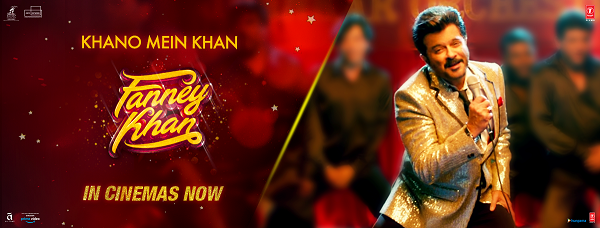



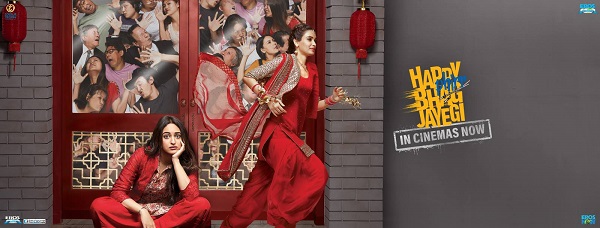
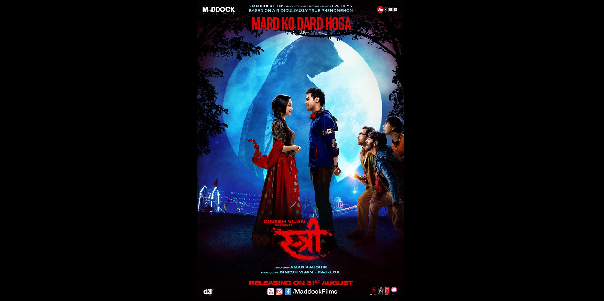

 ). Also, now would be a good time to go back to some of Govind’s older works if you are unfamiliar with them – particularly the theme song of
). Also, now would be a good time to go back to some of Govind’s older works if you are unfamiliar with them – particularly the theme song of 

